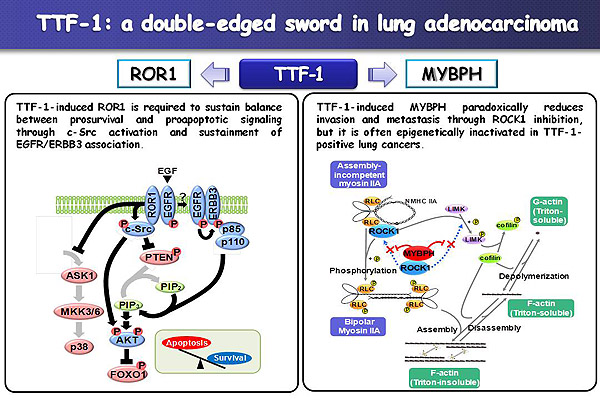▽Research
Lineage-survival signaling in lung cancers
Emerging evidence, though currently sparse, suggests that “lineage-specific transcription factors” with developmental roles in normal progenitor cells of particular lineages may also confer dependency for survival to certain types of cancer cells. We previously found that sustained expression of the TTF-1 transcription factor (also known as NKX2-1), which is necessary for peripheral lung development, is indispensable for survival and shows occasional increases in copy number in TTF-1-positive lung adenocarcinomas, which comprise more than half of the most prevalent type of lung cancer tumors. Interestingly, three other groups also reached similar conclusions through their search for genomic regions with focal amplifications.
We previously identified MYBPH as a transcriptional target of TTF-1 and its ROCK1-inhibiting and consequently invasion and metastasis-inhibiting roles. MYBPH is epigenetically inactivated in a fraction of TTF-1-positive lung adenocarcinomas, which appears to be in accordance with its deleterious functions in lung adenocarcinoma invasion and metastasis, as well as with the paradoxical association of TTF-1 expression with relatively favorable prognosis in lung adenocarcinoma patients. In addition, we have recently found that TTF-1-induced ROR1 is required to sustain a favorable balance between prosurvival PI3K-AKT signaling and the proapoptotic p38 pathway, collapse of which elicits “oncogenic shock”. ROR1 was also identified as a receptor tyrosine kinase with a “sustainer role” for the EGFR-ERBB3-mediated signaling. Our present efforts are currently dedicated to elucidation of the downstream signaling of TTF-1, which appears to be important not only for a better understanding of the molecular pathogenesis, but also for realizing development of a novel therapeutic means to target lineage-specific survival signals.

